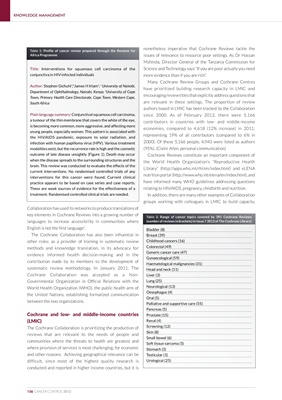
KNOWLEDGE MANAGEMENT
Table 1: Profile of cancer review prepared through the Reviews for
nonetheless imperative that Cochrane Reviews tackle the
Africa Programme issues of relevance to resource poor settings. As Dr Hassan
Mshinda, Director General of the Tanzania Commission for
Title: Interventions for squamous cell carcinoma of the Science and Technology says “If you are poor actually you need
conjunctiva in HIV-infected individuals more evidence than if you are rich”.
Many Cochrane Review Groups and Cochrane Centres
Author: Stephen Gichuhi1,*James H Irlam2; 1 University of Nairobi,
have prioritized building research capacity in LMIC and
Department of Ophthalmology, Nairobi, Kenya; 2University of Cape
encouraging review titles that explicitly address questions that
Town, Primary Health Care Directorate, Cape Town, Western Cape,
South Africa are relevant in these settings. The proportion of review
authors based in LMIC has been tracked by the Collaboration
Plain language summary: Conjunctival squamous cell carcinoma, since 2000. As of February 2012, there were 5,166
a tumour of the thin membrane that covers the white of the eye, contributors in countries with low- and middle-income
is becoming more common, more aggressive, and affecting more
economies, compared to 4,618 (12% increase) in 2011;
young people, especially women. This pattern is associated with
the HIV/AIDS pandemic, exposure to solar radiation, and
representing 19% of all contributors (compared to 6% in
infection with human papilloma virus (HPV). Various treatment 2000). Of these 5,166 people, 4,943 were listed as authors
modalities exist, but the recurrence rate is high and the cosmetic (95%). (Claire Allen, personal communication)
outcome of late disease unsightly (Figure 1). Death may occur Cochrane Reviews constitute an important component of
when the disease spreads to the surrounding structures and the the World Health Organization’s “Reproductive Health
brain. This review was conducted to evaluate the effects of the
Library” (http://apps.who.int/rhl/en/index.html) and eLENA
current interventions. No randomised controlled trials of any
interventions for this cancer were found. Current clinical
nutrition portal (http://www.who.int/elena/en/index.html), and
practice appears to be based on case series and case reports. have informed many WHO guidelines addressing questions
These are weak sources of evidence for the effectiveness of a relating to HIV/AIDS, pregnancy, childbirth and nutrition.
treatment. Randomised controlled clinical trials are needed. In addition, there are many other examples of Collaboration
groups working with colleagues in LMIC to build capacity,
Collaboration has used its networks to produce translations of
key elements in Cochrane Reviews into a growing number of Table 2: Range of cancer topics covered by 391 Cochrane Reviews
languages to increase accessibility in communities where (number of reviews in brackets) in Issue 7 2012 of The Cochrane Library)
English is not the first language2. Bladder (8)
The Cochrane Collaboration has also been influential in Breast (39)
other roles; as a provider of training in systematic review Childhood cancers (16)
methods and knowledge translation, in its advocacy for Colorectal (49)
Generic cancer care (47)
evidence informed health decision-making and in the
Gynaecological (59)
contribution made by its members to the development of
Haematological malignancies (31)
systematic review methodology. In January 2011, The Head and neck (11)
Cochrane Collaboration was accepted as a Non- Liver (3)
Governmental Organization in Official Relations with the Lung (25)
World Health Organization (WHO), the public health arm of Neurological (13)
Oesophagus (4)
the United Nations, establishing formalized communication
Oral (5)
between the two organizations.
Palliative and supportive care (55)
Pancreas (5)
Cochrane and low- and middle-income countries Prostate (15)
(LMIC) Renal (4)
The Cochrane Collaboration is prioritizing the production of Screening (12)
Skin (8)
reviews that are relevant to the needs of people and
Small bowel (6)
communities where the threats to health are greatest and
Soft tissue sarcoma (5)
where provision of services is most challenging, for economic Stomach (3)
and other reasons. Achieving geographical relevance can be Testicular (1)
difficult, since most of the highest quality research is Urological (25)
conducted and reported in higher income countries, but it is
156 CANCER CONTROL 2013